Entrepreneurship and Small Business Management Report: Tasks 1 & 2
VerifiedAdded on 2020/07/23
|20
|6003
|95
Report
AI Summary
This report provides a comprehensive overview of entrepreneurship and small business management. It begins by defining entrepreneurship and exploring various types of entrepreneurial ventures, including serial entrepreneurs, intrapreneurship, and owner-managers, and their relationship to different typologies. The report then delves into the differences and similarities between small businesses, scalable startups, large-scale businesses, and social enterprises, analyzing their objectives, funding, and impact. Furthermore, the report examines the characteristics, traits, and skills of successful entrepreneurs, linking these attributes to entrepreneurial motivations and mindset. It also discusses the environmental factors that can either foster or hinder entrepreneurship and the influence of personal background and experience on entrepreneurial success. The report concludes with a summary of the key findings and insights into the multifaceted nature of entrepreneurship.

ENTREPRENEURSHIP
AND SMALL BUSINESS
MANAGEMENT
AND SMALL BUSINESS
MANAGEMENT
Paraphrase This Document
Need a fresh take? Get an instant paraphrase of this document with our AI Paraphraser
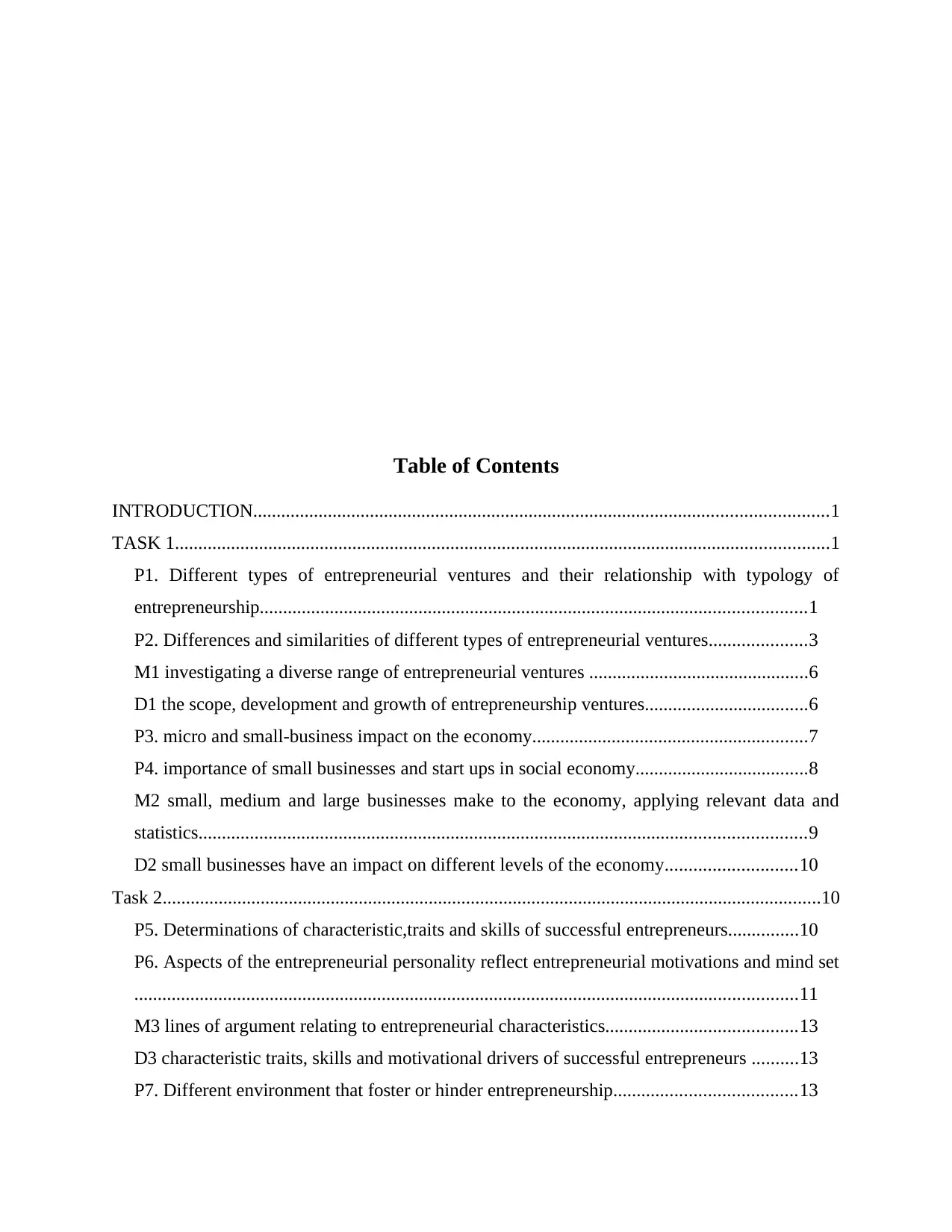
Table of Contents
INTRODUCTION...........................................................................................................................1
TASK 1............................................................................................................................................1
P1. Different types of entrepreneurial ventures and their relationship with typology of
entrepreneurship.....................................................................................................................1
P2. Differences and similarities of different types of entrepreneurial ventures.....................3
M1 investigating a diverse range of entrepreneurial ventures ...............................................6
D1 the scope, development and growth of entrepreneurship ventures...................................6
P3. micro and small-business impact on the economy...........................................................7
P4. importance of small businesses and start ups in social economy.....................................8
M2 small, medium and large businesses make to the economy, applying relevant data and
statistics..................................................................................................................................9
D2 small businesses have an impact on different levels of the economy............................10
Task 2.............................................................................................................................................10
P5. Determinations of characteristic,traits and skills of successful entrepreneurs...............10
P6. Aspects of the entrepreneurial personality reflect entrepreneurial motivations and mind set
..............................................................................................................................................11
M3 lines of argument relating to entrepreneurial characteristics.........................................13
D3 characteristic traits, skills and motivational drivers of successful entrepreneurs ..........13
P7. Different environment that foster or hinder entrepreneurship.......................................13
INTRODUCTION...........................................................................................................................1
TASK 1............................................................................................................................................1
P1. Different types of entrepreneurial ventures and their relationship with typology of
entrepreneurship.....................................................................................................................1
P2. Differences and similarities of different types of entrepreneurial ventures.....................3
M1 investigating a diverse range of entrepreneurial ventures ...............................................6
D1 the scope, development and growth of entrepreneurship ventures...................................6
P3. micro and small-business impact on the economy...........................................................7
P4. importance of small businesses and start ups in social economy.....................................8
M2 small, medium and large businesses make to the economy, applying relevant data and
statistics..................................................................................................................................9
D2 small businesses have an impact on different levels of the economy............................10
Task 2.............................................................................................................................................10
P5. Determinations of characteristic,traits and skills of successful entrepreneurs...............10
P6. Aspects of the entrepreneurial personality reflect entrepreneurial motivations and mind set
..............................................................................................................................................11
M3 lines of argument relating to entrepreneurial characteristics.........................................13
D3 characteristic traits, skills and motivational drivers of successful entrepreneurs ..........13
P7. Different environment that foster or hinder entrepreneurship.......................................13

M4 link between entrepreneurial characteristics and the influences of personal background
and experience......................................................................................................................14
D4 background and experiences influences entrepreneurs, both positively and negatively 14
CONCLUSION..............................................................................................................................14
REFERENCES..............................................................................................................................16
and experience......................................................................................................................14
D4 background and experiences influences entrepreneurs, both positively and negatively 14
CONCLUSION..............................................................................................................................14
REFERENCES..............................................................................................................................16
⊘ This is a preview!⊘
Do you want full access?
Subscribe today to unlock all pages.

Trusted by 1+ million students worldwide
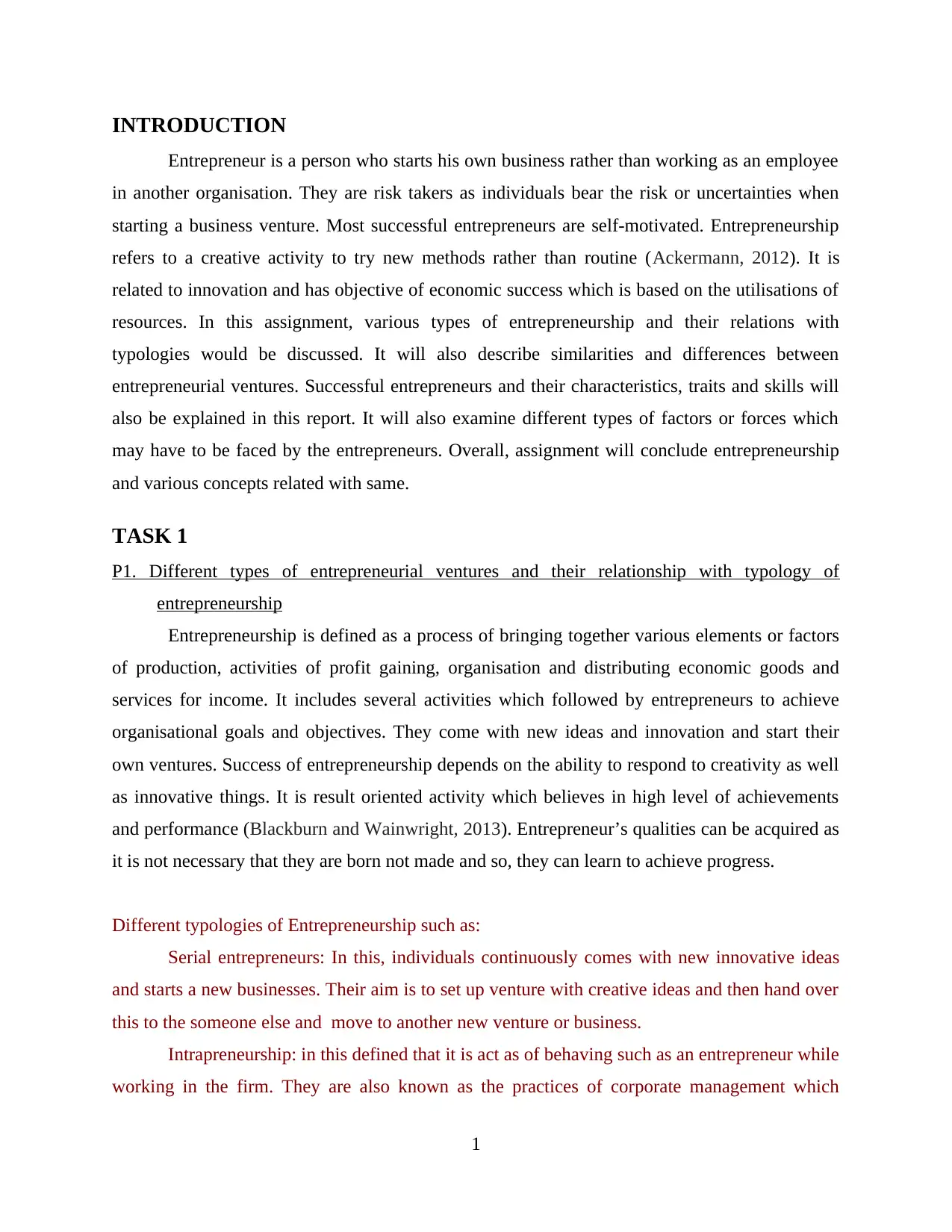
INTRODUCTION
Entrepreneur is a person who starts his own business rather than working as an employee
in another organisation. They are risk takers as individuals bear the risk or uncertainties when
starting a business venture. Most successful entrepreneurs are self-motivated. Entrepreneurship
refers to a creative activity to try new methods rather than routine (Ackermann, 2012). It is
related to innovation and has objective of economic success which is based on the utilisations of
resources. In this assignment, various types of entrepreneurship and their relations with
typologies would be discussed. It will also describe similarities and differences between
entrepreneurial ventures. Successful entrepreneurs and their characteristics, traits and skills will
also be explained in this report. It will also examine different types of factors or forces which
may have to be faced by the entrepreneurs. Overall, assignment will conclude entrepreneurship
and various concepts related with same.
TASK 1
P1. Different types of entrepreneurial ventures and their relationship with typology of
entrepreneurship
Entrepreneurship is defined as a process of bringing together various elements or factors
of production, activities of profit gaining, organisation and distributing economic goods and
services for income. It includes several activities which followed by entrepreneurs to achieve
organisational goals and objectives. They come with new ideas and innovation and start their
own ventures. Success of entrepreneurship depends on the ability to respond to creativity as well
as innovative things. It is result oriented activity which believes in high level of achievements
and performance (Blackburn and Wainwright, 2013). Entrepreneur’s qualities can be acquired as
it is not necessary that they are born not made and so, they can learn to achieve progress.
Different typologies of Entrepreneurship such as:
Serial entrepreneurs: In this, individuals continuously comes with new innovative ideas
and starts a new businesses. Their aim is to set up venture with creative ideas and then hand over
this to the someone else and move to another new venture or business.
Intrapreneurship: in this defined that it is act as of behaving such as an entrepreneur while
working in the firm. They are also known as the practices of corporate management which
1
Entrepreneur is a person who starts his own business rather than working as an employee
in another organisation. They are risk takers as individuals bear the risk or uncertainties when
starting a business venture. Most successful entrepreneurs are self-motivated. Entrepreneurship
refers to a creative activity to try new methods rather than routine (Ackermann, 2012). It is
related to innovation and has objective of economic success which is based on the utilisations of
resources. In this assignment, various types of entrepreneurship and their relations with
typologies would be discussed. It will also describe similarities and differences between
entrepreneurial ventures. Successful entrepreneurs and their characteristics, traits and skills will
also be explained in this report. It will also examine different types of factors or forces which
may have to be faced by the entrepreneurs. Overall, assignment will conclude entrepreneurship
and various concepts related with same.
TASK 1
P1. Different types of entrepreneurial ventures and their relationship with typology of
entrepreneurship
Entrepreneurship is defined as a process of bringing together various elements or factors
of production, activities of profit gaining, organisation and distributing economic goods and
services for income. It includes several activities which followed by entrepreneurs to achieve
organisational goals and objectives. They come with new ideas and innovation and start their
own ventures. Success of entrepreneurship depends on the ability to respond to creativity as well
as innovative things. It is result oriented activity which believes in high level of achievements
and performance (Blackburn and Wainwright, 2013). Entrepreneur’s qualities can be acquired as
it is not necessary that they are born not made and so, they can learn to achieve progress.
Different typologies of Entrepreneurship such as:
Serial entrepreneurs: In this, individuals continuously comes with new innovative ideas
and starts a new businesses. Their aim is to set up venture with creative ideas and then hand over
this to the someone else and move to another new venture or business.
Intrapreneurship: in this defined that it is act as of behaving such as an entrepreneur while
working in the firm. They are also known as the practices of corporate management which
1
Paraphrase This Document
Need a fresh take? Get an instant paraphrase of this document with our AI Paraphraser
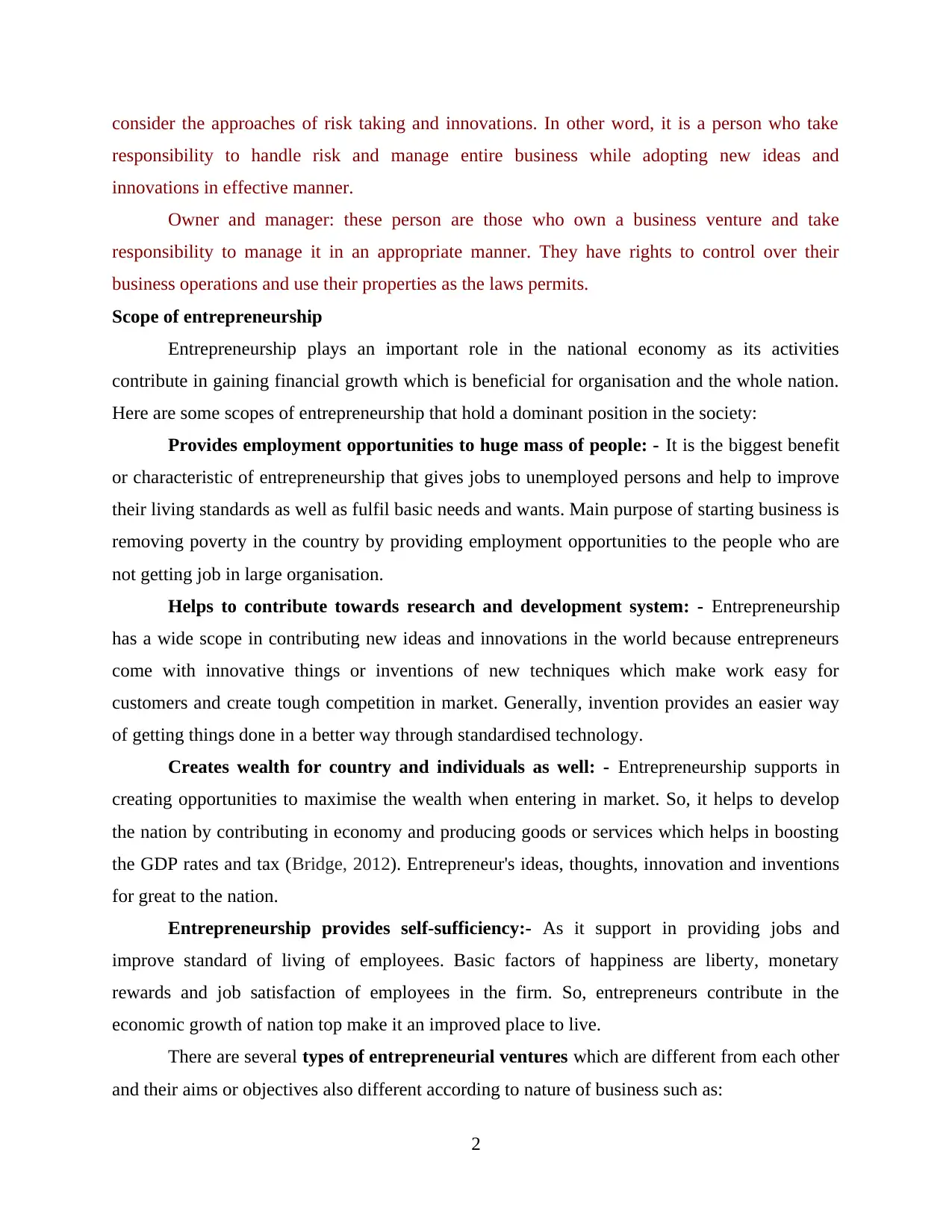
consider the approaches of risk taking and innovations. In other word, it is a person who take
responsibility to handle risk and manage entire business while adopting new ideas and
innovations in effective manner.
Owner and manager: these person are those who own a business venture and take
responsibility to manage it in an appropriate manner. They have rights to control over their
business operations and use their properties as the laws permits.
Scope of entrepreneurship
Entrepreneurship plays an important role in the national economy as its activities
contribute in gaining financial growth which is beneficial for organisation and the whole nation.
Here are some scopes of entrepreneurship that hold a dominant position in the society:
Provides employment opportunities to huge mass of people: - It is the biggest benefit
or characteristic of entrepreneurship that gives jobs to unemployed persons and help to improve
their living standards as well as fulfil basic needs and wants. Main purpose of starting business is
removing poverty in the country by providing employment opportunities to the people who are
not getting job in large organisation.
Helps to contribute towards research and development system: - Entrepreneurship
has a wide scope in contributing new ideas and innovations in the world because entrepreneurs
come with innovative things or inventions of new techniques which make work easy for
customers and create tough competition in market. Generally, invention provides an easier way
of getting things done in a better way through standardised technology.
Creates wealth for country and individuals as well: - Entrepreneurship supports in
creating opportunities to maximise the wealth when entering in market. So, it helps to develop
the nation by contributing in economy and producing goods or services which helps in boosting
the GDP rates and tax (Bridge, 2012). Entrepreneur's ideas, thoughts, innovation and inventions
for great to the nation.
Entrepreneurship provides self-sufficiency:- As it support in providing jobs and
improve standard of living of employees. Basic factors of happiness are liberty, monetary
rewards and job satisfaction of employees in the firm. So, entrepreneurs contribute in the
economic growth of nation top make it an improved place to live.
There are several types of entrepreneurial ventures which are different from each other
and their aims or objectives also different according to nature of business such as:
2
responsibility to handle risk and manage entire business while adopting new ideas and
innovations in effective manner.
Owner and manager: these person are those who own a business venture and take
responsibility to manage it in an appropriate manner. They have rights to control over their
business operations and use their properties as the laws permits.
Scope of entrepreneurship
Entrepreneurship plays an important role in the national economy as its activities
contribute in gaining financial growth which is beneficial for organisation and the whole nation.
Here are some scopes of entrepreneurship that hold a dominant position in the society:
Provides employment opportunities to huge mass of people: - It is the biggest benefit
or characteristic of entrepreneurship that gives jobs to unemployed persons and help to improve
their living standards as well as fulfil basic needs and wants. Main purpose of starting business is
removing poverty in the country by providing employment opportunities to the people who are
not getting job in large organisation.
Helps to contribute towards research and development system: - Entrepreneurship
has a wide scope in contributing new ideas and innovations in the world because entrepreneurs
come with innovative things or inventions of new techniques which make work easy for
customers and create tough competition in market. Generally, invention provides an easier way
of getting things done in a better way through standardised technology.
Creates wealth for country and individuals as well: - Entrepreneurship supports in
creating opportunities to maximise the wealth when entering in market. So, it helps to develop
the nation by contributing in economy and producing goods or services which helps in boosting
the GDP rates and tax (Bridge, 2012). Entrepreneur's ideas, thoughts, innovation and inventions
for great to the nation.
Entrepreneurship provides self-sufficiency:- As it support in providing jobs and
improve standard of living of employees. Basic factors of happiness are liberty, monetary
rewards and job satisfaction of employees in the firm. So, entrepreneurs contribute in the
economic growth of nation top make it an improved place to live.
There are several types of entrepreneurial ventures which are different from each other
and their aims or objectives also different according to nature of business such as:
2
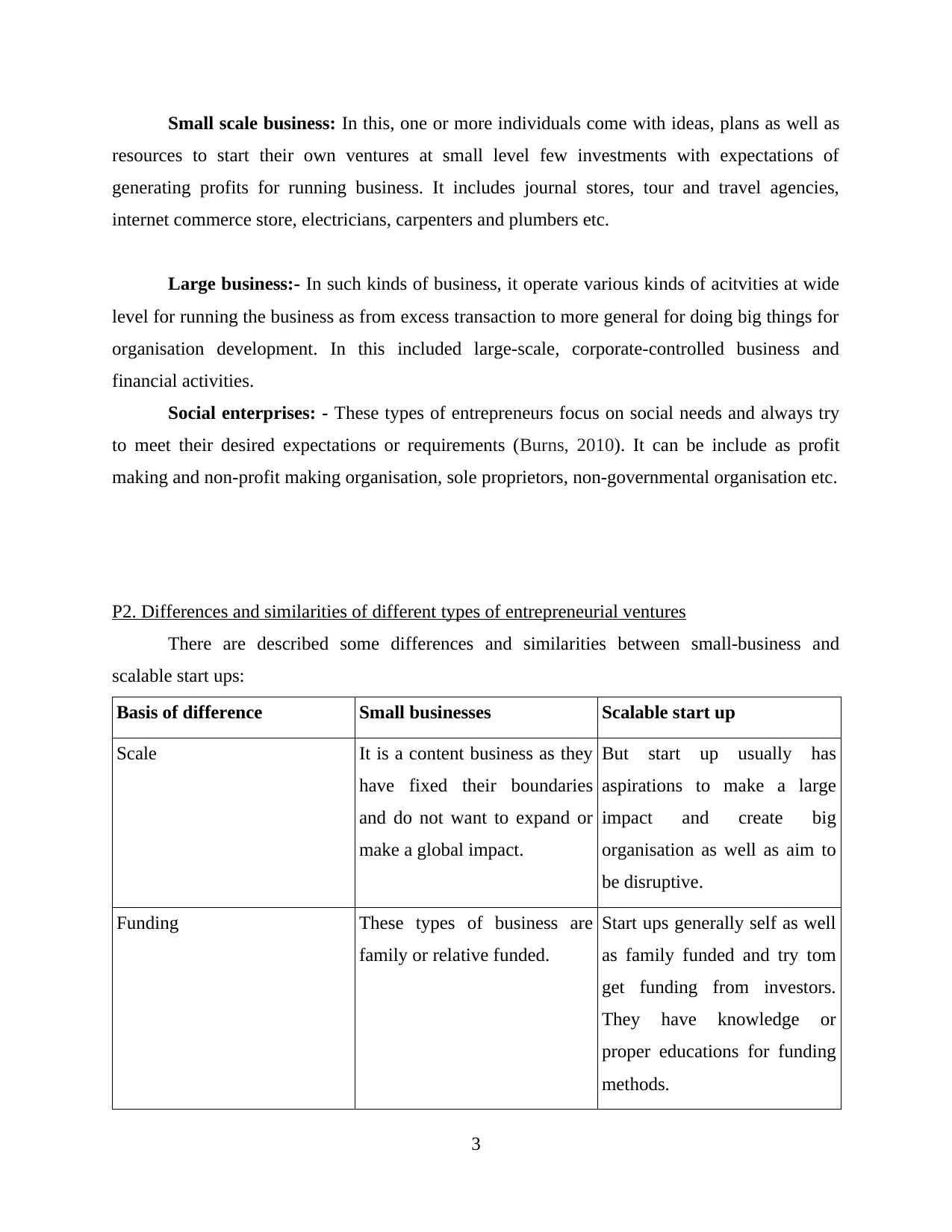
Small scale business: In this, one or more individuals come with ideas, plans as well as
resources to start their own ventures at small level few investments with expectations of
generating profits for running business. It includes journal stores, tour and travel agencies,
internet commerce store, electricians, carpenters and plumbers etc.
Large business:- In such kinds of business, it operate various kinds of acitvities at wide
level for running the business as from excess transaction to more general for doing big things for
organisation development. In this included large-scale, corporate-controlled business and
financial activities.
Social enterprises: - These types of entrepreneurs focus on social needs and always try
to meet their desired expectations or requirements (Burns, 2010). It can be include as profit
making and non-profit making organisation, sole proprietors, non-governmental organisation etc.
P2. Differences and similarities of different types of entrepreneurial ventures
There are described some differences and similarities between small-business and
scalable start ups:
Basis of difference Small businesses Scalable start up
Scale It is a content business as they
have fixed their boundaries
and do not want to expand or
make a global impact.
But start up usually has
aspirations to make a large
impact and create big
organisation as well as aim to
be disruptive.
Funding These types of business are
family or relative funded.
Start ups generally self as well
as family funded and try tom
get funding from investors.
They have knowledge or
proper educations for funding
methods.
3
resources to start their own ventures at small level few investments with expectations of
generating profits for running business. It includes journal stores, tour and travel agencies,
internet commerce store, electricians, carpenters and plumbers etc.
Large business:- In such kinds of business, it operate various kinds of acitvities at wide
level for running the business as from excess transaction to more general for doing big things for
organisation development. In this included large-scale, corporate-controlled business and
financial activities.
Social enterprises: - These types of entrepreneurs focus on social needs and always try
to meet their desired expectations or requirements (Burns, 2010). It can be include as profit
making and non-profit making organisation, sole proprietors, non-governmental organisation etc.
P2. Differences and similarities of different types of entrepreneurial ventures
There are described some differences and similarities between small-business and
scalable start ups:
Basis of difference Small businesses Scalable start up
Scale It is a content business as they
have fixed their boundaries
and do not want to expand or
make a global impact.
But start up usually has
aspirations to make a large
impact and create big
organisation as well as aim to
be disruptive.
Funding These types of business are
family or relative funded.
Start ups generally self as well
as family funded and try tom
get funding from investors.
They have knowledge or
proper educations for funding
methods.
3
⊘ This is a preview!⊘
Do you want full access?
Subscribe today to unlock all pages.

Trusted by 1+ million students worldwide
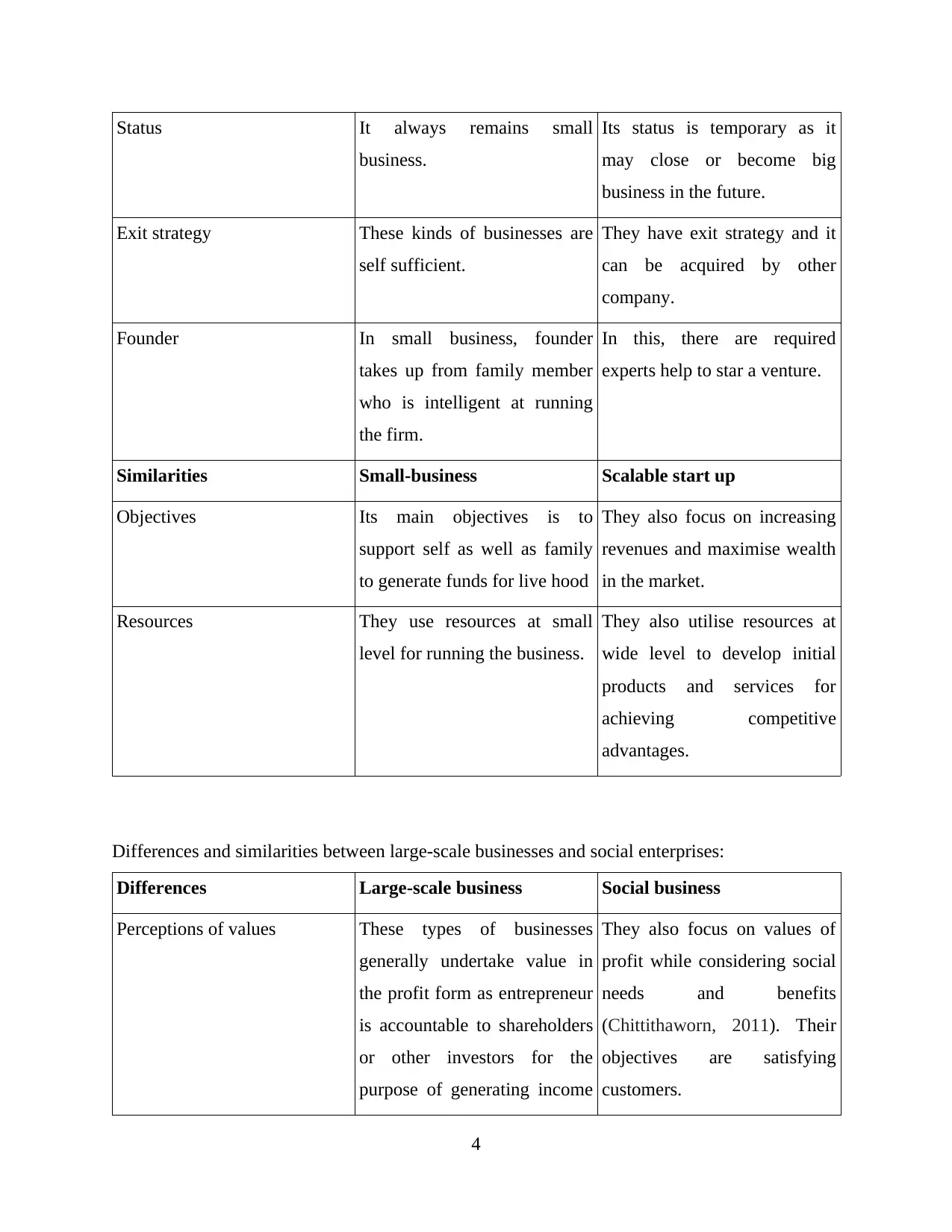
Status It always remains small
business.
Its status is temporary as it
may close or become big
business in the future.
Exit strategy These kinds of businesses are
self sufficient.
They have exit strategy and it
can be acquired by other
company.
Founder In small business, founder
takes up from family member
who is intelligent at running
the firm.
In this, there are required
experts help to star a venture.
Similarities Small-business Scalable start up
Objectives Its main objectives is to
support self as well as family
to generate funds for live hood
They also focus on increasing
revenues and maximise wealth
in the market.
Resources They use resources at small
level for running the business.
They also utilise resources at
wide level to develop initial
products and services for
achieving competitive
advantages.
Differences and similarities between large-scale businesses and social enterprises:
Differences Large-scale business Social business
Perceptions of values These types of businesses
generally undertake value in
the profit form as entrepreneur
is accountable to shareholders
or other investors for the
purpose of generating income
They also focus on values of
profit while considering social
needs and benefits
(Chittithaworn, 2011). Their
objectives are satisfying
customers.
4
business.
Its status is temporary as it
may close or become big
business in the future.
Exit strategy These kinds of businesses are
self sufficient.
They have exit strategy and it
can be acquired by other
company.
Founder In small business, founder
takes up from family member
who is intelligent at running
the firm.
In this, there are required
experts help to star a venture.
Similarities Small-business Scalable start up
Objectives Its main objectives is to
support self as well as family
to generate funds for live hood
They also focus on increasing
revenues and maximise wealth
in the market.
Resources They use resources at small
level for running the business.
They also utilise resources at
wide level to develop initial
products and services for
achieving competitive
advantages.
Differences and similarities between large-scale businesses and social enterprises:
Differences Large-scale business Social business
Perceptions of values These types of businesses
generally undertake value in
the profit form as entrepreneur
is accountable to shareholders
or other investors for the
purpose of generating income
They also focus on values of
profit while considering social
needs and benefits
(Chittithaworn, 2011). Their
objectives are satisfying
customers.
4
Paraphrase This Document
Need a fresh take? Get an instant paraphrase of this document with our AI Paraphraser
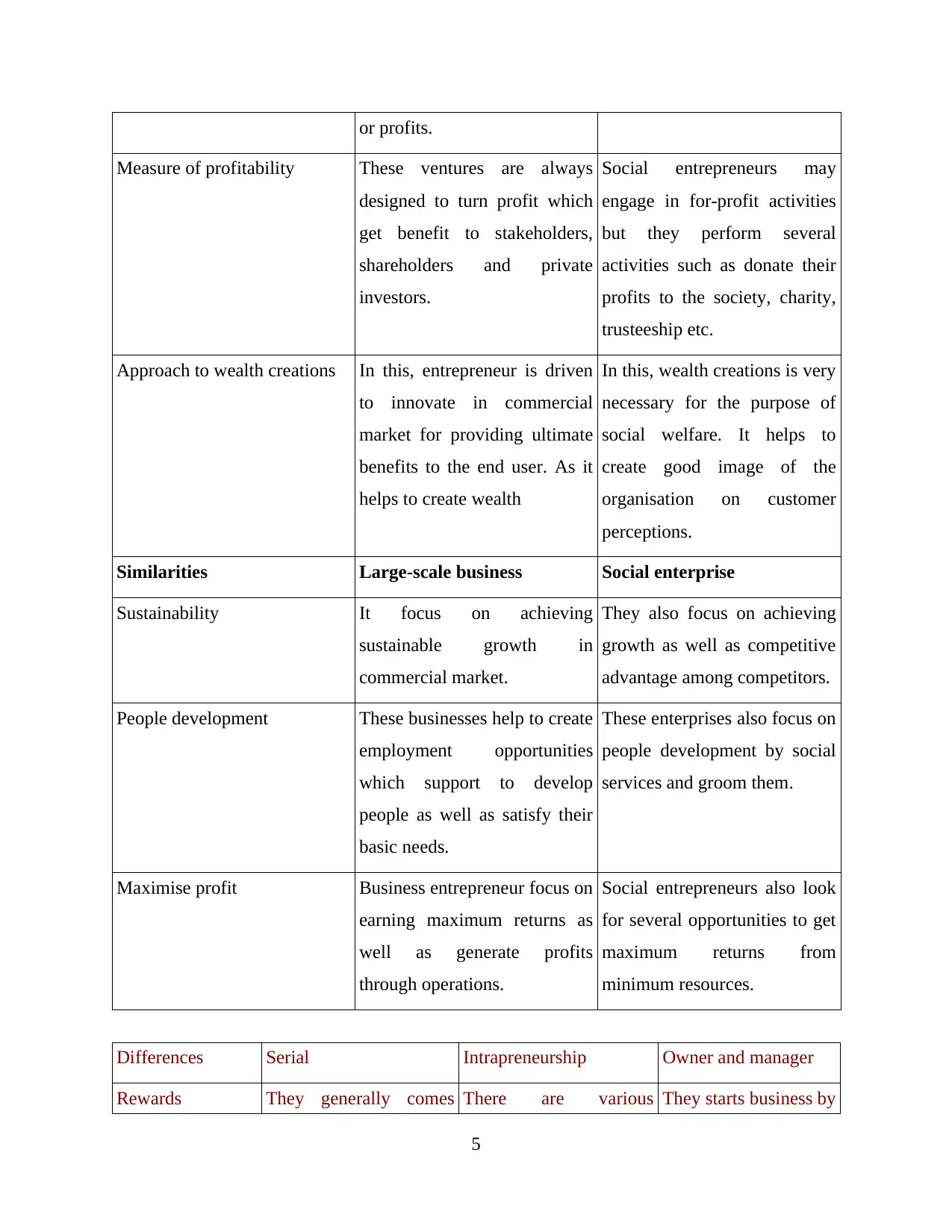
or profits.
Measure of profitability These ventures are always
designed to turn profit which
get benefit to stakeholders,
shareholders and private
investors.
Social entrepreneurs may
engage in for-profit activities
but they perform several
activities such as donate their
profits to the society, charity,
trusteeship etc.
Approach to wealth creations In this, entrepreneur is driven
to innovate in commercial
market for providing ultimate
benefits to the end user. As it
helps to create wealth
In this, wealth creations is very
necessary for the purpose of
social welfare. It helps to
create good image of the
organisation on customer
perceptions.
Similarities Large-scale business Social enterprise
Sustainability It focus on achieving
sustainable growth in
commercial market.
They also focus on achieving
growth as well as competitive
advantage among competitors.
People development These businesses help to create
employment opportunities
which support to develop
people as well as satisfy their
basic needs.
These enterprises also focus on
people development by social
services and groom them.
Maximise profit Business entrepreneur focus on
earning maximum returns as
well as generate profits
through operations.
Social entrepreneurs also look
for several opportunities to get
maximum returns from
minimum resources.
Differences Serial Intrapreneurship Owner and manager
Rewards They generally comes There are various They starts business by
5
Measure of profitability These ventures are always
designed to turn profit which
get benefit to stakeholders,
shareholders and private
investors.
Social entrepreneurs may
engage in for-profit activities
but they perform several
activities such as donate their
profits to the society, charity,
trusteeship etc.
Approach to wealth creations In this, entrepreneur is driven
to innovate in commercial
market for providing ultimate
benefits to the end user. As it
helps to create wealth
In this, wealth creations is very
necessary for the purpose of
social welfare. It helps to
create good image of the
organisation on customer
perceptions.
Similarities Large-scale business Social enterprise
Sustainability It focus on achieving
sustainable growth in
commercial market.
They also focus on achieving
growth as well as competitive
advantage among competitors.
People development These businesses help to create
employment opportunities
which support to develop
people as well as satisfy their
basic needs.
These enterprises also focus on
people development by social
services and groom them.
Maximise profit Business entrepreneur focus on
earning maximum returns as
well as generate profits
through operations.
Social entrepreneurs also look
for several opportunities to get
maximum returns from
minimum resources.
Differences Serial Intrapreneurship Owner and manager
Rewards They generally comes There are various They starts business by
5

with new ideas and
innovation to starts their
own venture and then
give it to the another
person and move on
towards other new
business. They are
provided rewards for
their antique ideas or
creativity.
intrapreneurs who take
responsibility for
managing entire business
and take risks while
bringing innovations so
company provide them
different rewards for
their work.
bringing some
resources and assets
which have legal rights
over properties and
other resources. They
are responsible for
managing business in
an effective manner.
Similarities
Accountability
Serial entrepreneurs use
various innovative
sources and ideas to
develop any particular
business as they focus on
setting up effective
business in the
competitive
environment.
This firm also have such
accountability as they
also try to make better
organisation by facing
number risks and achieve
competitive advantages
in an appropriate
manner.
They are entrepreneurs
who consider the
accountability while
managing and
operating small firms.
They have rights to
make their own
decisions regarding
properties and
resources uses.
M1 investigating a diverse range of entrepreneurial ventures
Entrepreneurial venture generally comes with new innovative ideas and several creativity which
helps in developing the firm in an effective manner. There are number of risks involved while
starting a new venture so individual face several kinds of issues and problems regarding
business. Including threats of competitors, risks of fund investments and lack of various
resources etc.
Scalable start up entrepreneurship: - Entrepreneurs consider that their vision could change the
world, so they start venture with passionate and confidence. They use scalable business model
6
innovation to starts their
own venture and then
give it to the another
person and move on
towards other new
business. They are
provided rewards for
their antique ideas or
creativity.
intrapreneurs who take
responsibility for
managing entire business
and take risks while
bringing innovations so
company provide them
different rewards for
their work.
bringing some
resources and assets
which have legal rights
over properties and
other resources. They
are responsible for
managing business in
an effective manner.
Similarities
Accountability
Serial entrepreneurs use
various innovative
sources and ideas to
develop any particular
business as they focus on
setting up effective
business in the
competitive
environment.
This firm also have such
accountability as they
also try to make better
organisation by facing
number risks and achieve
competitive advantages
in an appropriate
manner.
They are entrepreneurs
who consider the
accountability while
managing and
operating small firms.
They have rights to
make their own
decisions regarding
properties and
resources uses.
M1 investigating a diverse range of entrepreneurial ventures
Entrepreneurial venture generally comes with new innovative ideas and several creativity which
helps in developing the firm in an effective manner. There are number of risks involved while
starting a new venture so individual face several kinds of issues and problems regarding
business. Including threats of competitors, risks of fund investments and lack of various
resources etc.
Scalable start up entrepreneurship: - Entrepreneurs consider that their vision could change the
world, so they start venture with passionate and confidence. They use scalable business model
6
⊘ This is a preview!⊘
Do you want full access?
Subscribe today to unlock all pages.

Trusted by 1+ million students worldwide
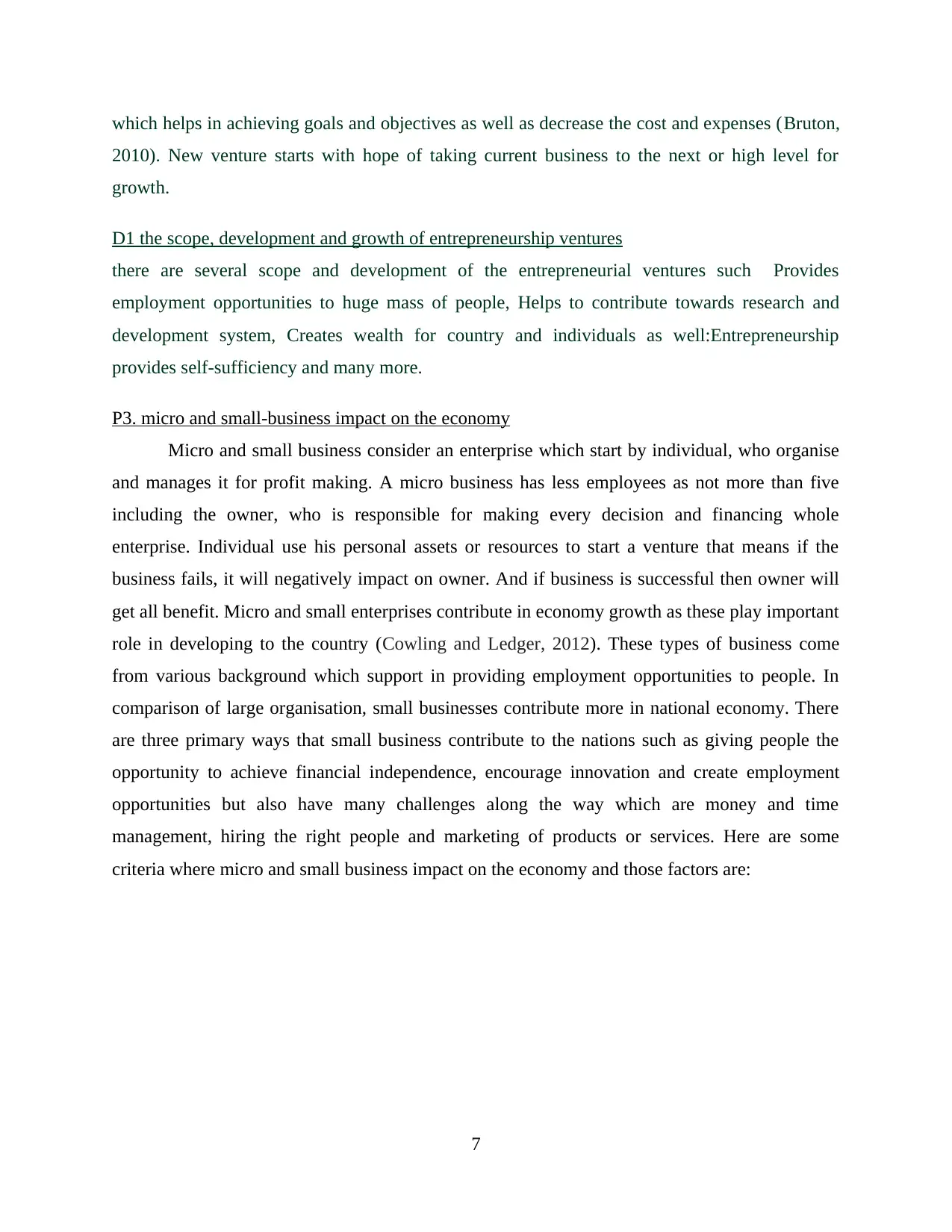
which helps in achieving goals and objectives as well as decrease the cost and expenses (Bruton,
2010). New venture starts with hope of taking current business to the next or high level for
growth.
D1 the scope, development and growth of entrepreneurship ventures
there are several scope and development of the entrepreneurial ventures such Provides
employment opportunities to huge mass of people, Helps to contribute towards research and
development system, Creates wealth for country and individuals as well:Entrepreneurship
provides self-sufficiency and many more.
P3. micro and small-business impact on the economy
Micro and small business consider an enterprise which start by individual, who organise
and manages it for profit making. A micro business has less employees as not more than five
including the owner, who is responsible for making every decision and financing whole
enterprise. Individual use his personal assets or resources to start a venture that means if the
business fails, it will negatively impact on owner. And if business is successful then owner will
get all benefit. Micro and small enterprises contribute in economy growth as these play important
role in developing to the country (Cowling and Ledger, 2012). These types of business come
from various background which support in providing employment opportunities to people. In
comparison of large organisation, small businesses contribute more in national economy. There
are three primary ways that small business contribute to the nations such as giving people the
opportunity to achieve financial independence, encourage innovation and create employment
opportunities but also have many challenges along the way which are money and time
management, hiring the right people and marketing of products or services. Here are some
criteria where micro and small business impact on the economy and those factors are:
7
2010). New venture starts with hope of taking current business to the next or high level for
growth.
D1 the scope, development and growth of entrepreneurship ventures
there are several scope and development of the entrepreneurial ventures such Provides
employment opportunities to huge mass of people, Helps to contribute towards research and
development system, Creates wealth for country and individuals as well:Entrepreneurship
provides self-sufficiency and many more.
P3. micro and small-business impact on the economy
Micro and small business consider an enterprise which start by individual, who organise
and manages it for profit making. A micro business has less employees as not more than five
including the owner, who is responsible for making every decision and financing whole
enterprise. Individual use his personal assets or resources to start a venture that means if the
business fails, it will negatively impact on owner. And if business is successful then owner will
get all benefit. Micro and small enterprises contribute in economy growth as these play important
role in developing to the country (Cowling and Ledger, 2012). These types of business come
from various background which support in providing employment opportunities to people. In
comparison of large organisation, small businesses contribute more in national economy. There
are three primary ways that small business contribute to the nations such as giving people the
opportunity to achieve financial independence, encourage innovation and create employment
opportunities but also have many challenges along the way which are money and time
management, hiring the right people and marketing of products or services. Here are some
criteria where micro and small business impact on the economy and those factors are:
7
Paraphrase This Document
Need a fresh take? Get an instant paraphrase of this document with our AI Paraphraser
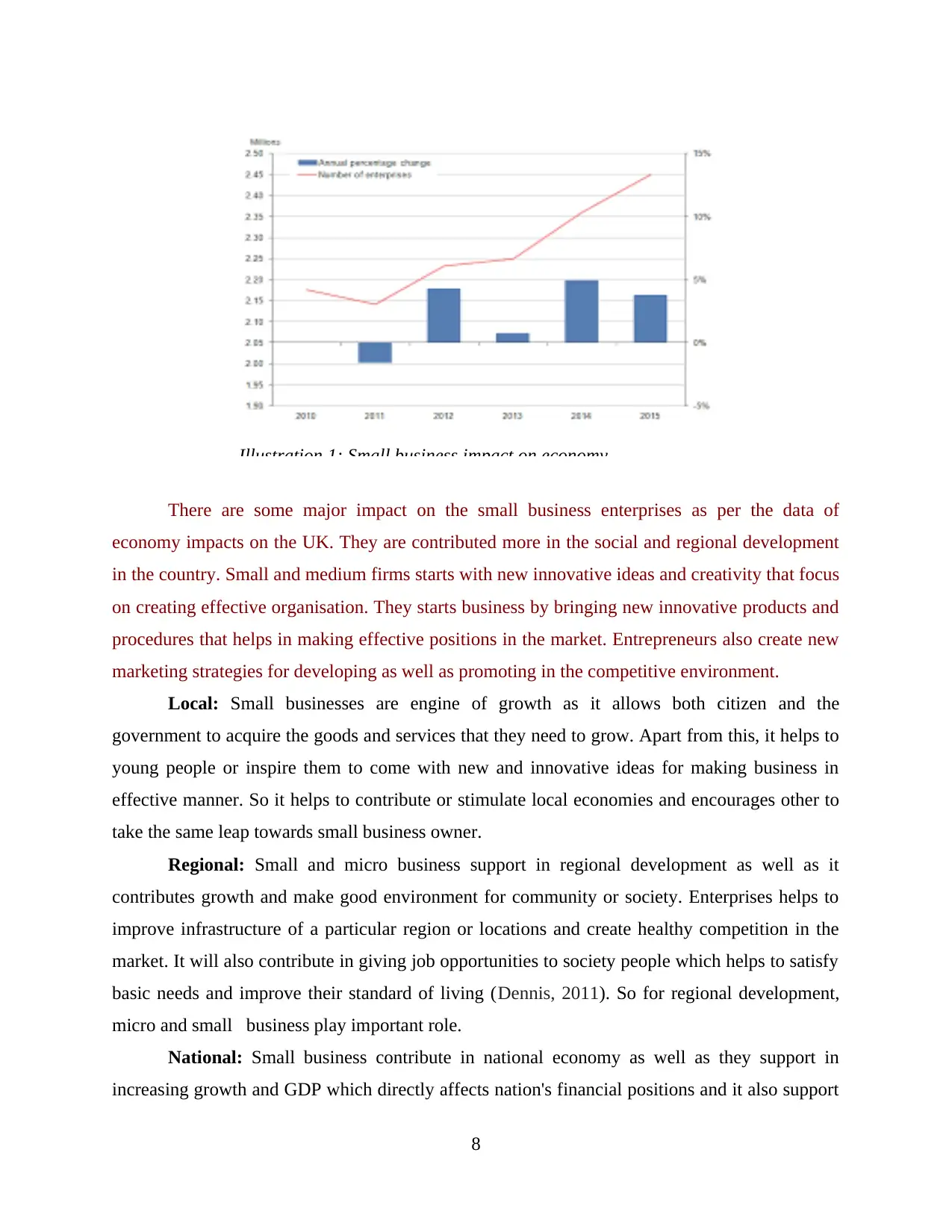
There are some major impact on the small business enterprises as per the data of
economy impacts on the UK. They are contributed more in the social and regional development
in the country. Small and medium firms starts with new innovative ideas and creativity that focus
on creating effective organisation. They starts business by bringing new innovative products and
procedures that helps in making effective positions in the market. Entrepreneurs also create new
marketing strategies for developing as well as promoting in the competitive environment.
Local: Small businesses are engine of growth as it allows both citizen and the
government to acquire the goods and services that they need to grow. Apart from this, it helps to
young people or inspire them to come with new and innovative ideas for making business in
effective manner. So it helps to contribute or stimulate local economies and encourages other to
take the same leap towards small business owner.
Regional: Small and micro business support in regional development as well as it
contributes growth and make good environment for community or society. Enterprises helps to
improve infrastructure of a particular region or locations and create healthy competition in the
market. It will also contribute in giving job opportunities to society people which helps to satisfy
basic needs and improve their standard of living (Dennis, 2011). So for regional development,
micro and small business play important role.
National: Small business contribute in national economy as well as they support in
increasing growth and GDP which directly affects nation's financial positions and it also support
8
Illustration 1: Small business impact on economy
economy impacts on the UK. They are contributed more in the social and regional development
in the country. Small and medium firms starts with new innovative ideas and creativity that focus
on creating effective organisation. They starts business by bringing new innovative products and
procedures that helps in making effective positions in the market. Entrepreneurs also create new
marketing strategies for developing as well as promoting in the competitive environment.
Local: Small businesses are engine of growth as it allows both citizen and the
government to acquire the goods and services that they need to grow. Apart from this, it helps to
young people or inspire them to come with new and innovative ideas for making business in
effective manner. So it helps to contribute or stimulate local economies and encourages other to
take the same leap towards small business owner.
Regional: Small and micro business support in regional development as well as it
contributes growth and make good environment for community or society. Enterprises helps to
improve infrastructure of a particular region or locations and create healthy competition in the
market. It will also contribute in giving job opportunities to society people which helps to satisfy
basic needs and improve their standard of living (Dennis, 2011). So for regional development,
micro and small business play important role.
National: Small business contribute in national economy as well as they support in
increasing growth and GDP which directly affects nation's financial positions and it also support
8
Illustration 1: Small business impact on economy
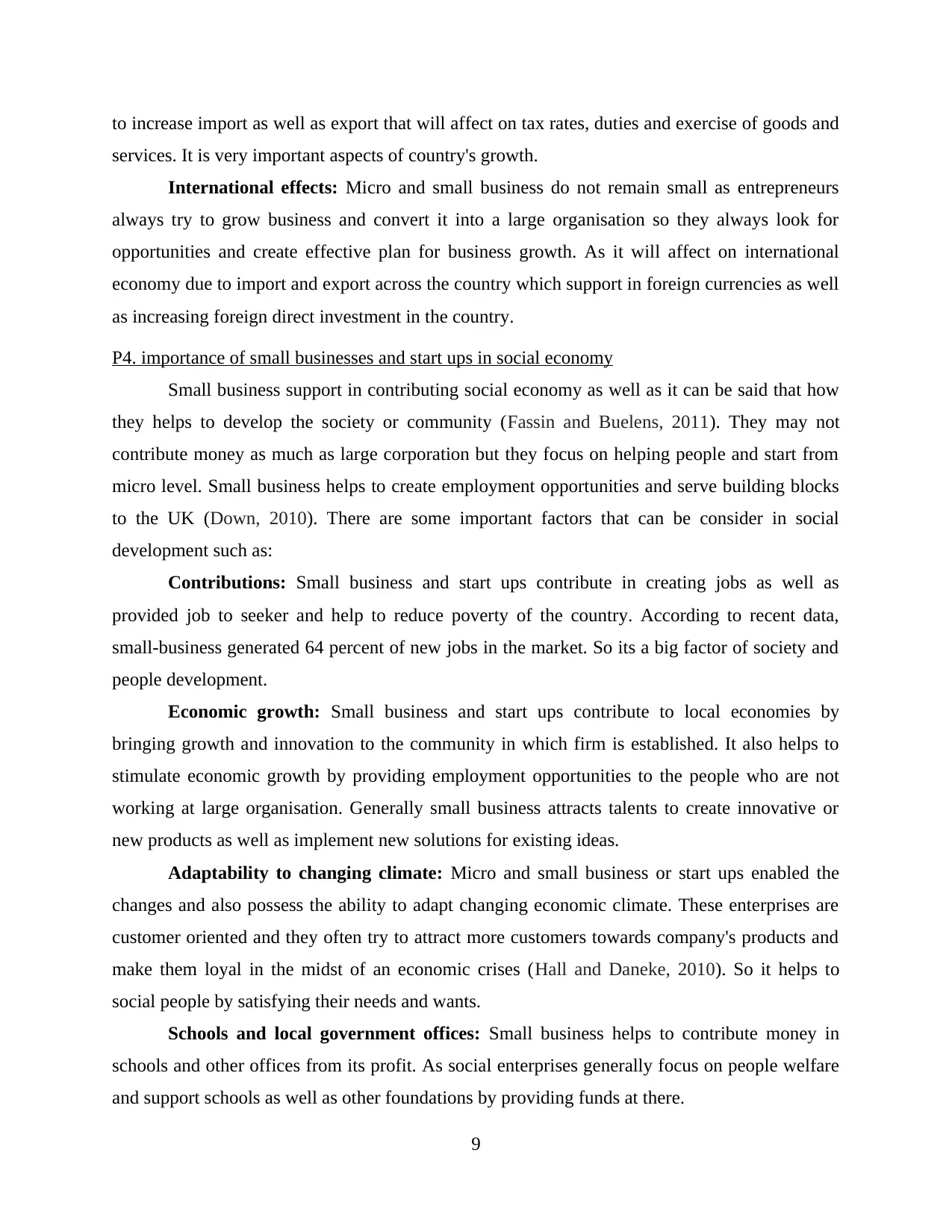
to increase import as well as export that will affect on tax rates, duties and exercise of goods and
services. It is very important aspects of country's growth.
International effects: Micro and small business do not remain small as entrepreneurs
always try to grow business and convert it into a large organisation so they always look for
opportunities and create effective plan for business growth. As it will affect on international
economy due to import and export across the country which support in foreign currencies as well
as increasing foreign direct investment in the country.
P4. importance of small businesses and start ups in social economy
Small business support in contributing social economy as well as it can be said that how
they helps to develop the society or community (Fassin and Buelens, 2011). They may not
contribute money as much as large corporation but they focus on helping people and start from
micro level. Small business helps to create employment opportunities and serve building blocks
to the UK (Down, 2010). There are some important factors that can be consider in social
development such as:
Contributions: Small business and start ups contribute in creating jobs as well as
provided job to seeker and help to reduce poverty of the country. According to recent data,
small-business generated 64 percent of new jobs in the market. So its a big factor of society and
people development.
Economic growth: Small business and start ups contribute to local economies by
bringing growth and innovation to the community in which firm is established. It also helps to
stimulate economic growth by providing employment opportunities to the people who are not
working at large organisation. Generally small business attracts talents to create innovative or
new products as well as implement new solutions for existing ideas.
Adaptability to changing climate: Micro and small business or start ups enabled the
changes and also possess the ability to adapt changing economic climate. These enterprises are
customer oriented and they often try to attract more customers towards company's products and
make them loyal in the midst of an economic crises (Hall and Daneke, 2010). So it helps to
social people by satisfying their needs and wants.
Schools and local government offices: Small business helps to contribute money in
schools and other offices from its profit. As social enterprises generally focus on people welfare
and support schools as well as other foundations by providing funds at there.
9
services. It is very important aspects of country's growth.
International effects: Micro and small business do not remain small as entrepreneurs
always try to grow business and convert it into a large organisation so they always look for
opportunities and create effective plan for business growth. As it will affect on international
economy due to import and export across the country which support in foreign currencies as well
as increasing foreign direct investment in the country.
P4. importance of small businesses and start ups in social economy
Small business support in contributing social economy as well as it can be said that how
they helps to develop the society or community (Fassin and Buelens, 2011). They may not
contribute money as much as large corporation but they focus on helping people and start from
micro level. Small business helps to create employment opportunities and serve building blocks
to the UK (Down, 2010). There are some important factors that can be consider in social
development such as:
Contributions: Small business and start ups contribute in creating jobs as well as
provided job to seeker and help to reduce poverty of the country. According to recent data,
small-business generated 64 percent of new jobs in the market. So its a big factor of society and
people development.
Economic growth: Small business and start ups contribute to local economies by
bringing growth and innovation to the community in which firm is established. It also helps to
stimulate economic growth by providing employment opportunities to the people who are not
working at large organisation. Generally small business attracts talents to create innovative or
new products as well as implement new solutions for existing ideas.
Adaptability to changing climate: Micro and small business or start ups enabled the
changes and also possess the ability to adapt changing economic climate. These enterprises are
customer oriented and they often try to attract more customers towards company's products and
make them loyal in the midst of an economic crises (Hall and Daneke, 2010). So it helps to
social people by satisfying their needs and wants.
Schools and local government offices: Small business helps to contribute money in
schools and other offices from its profit. As social enterprises generally focus on people welfare
and support schools as well as other foundations by providing funds at there.
9
⊘ This is a preview!⊘
Do you want full access?
Subscribe today to unlock all pages.

Trusted by 1+ million students worldwide
1 out of 20
Related Documents
Your All-in-One AI-Powered Toolkit for Academic Success.
+13062052269
info@desklib.com
Available 24*7 on WhatsApp / Email
![[object Object]](/_next/static/media/star-bottom.7253800d.svg)
Unlock your academic potential
Copyright © 2020–2025 A2Z Services. All Rights Reserved. Developed and managed by ZUCOL.





